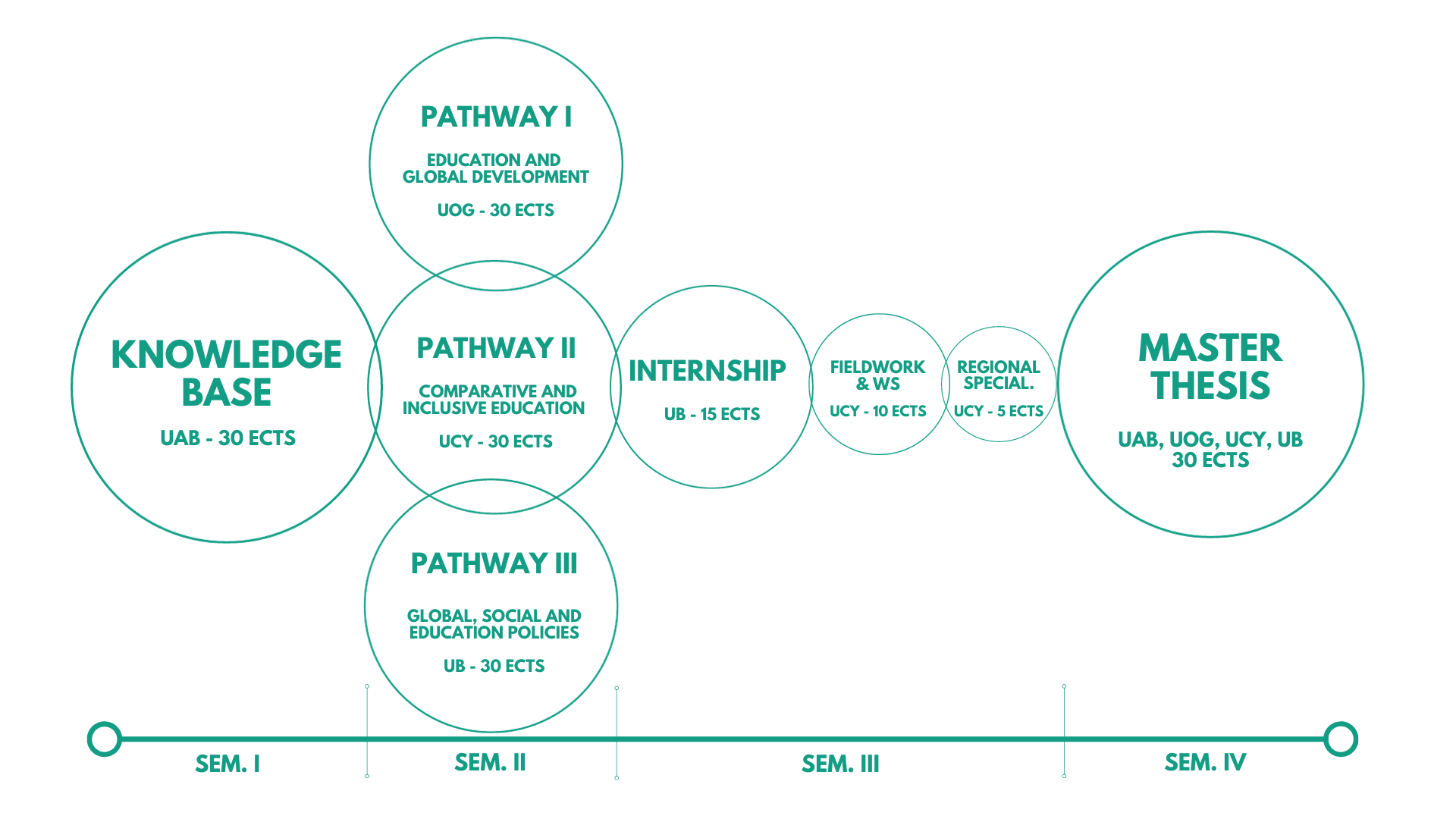Study program
The Erasmus Mundus Joint Master in Education Policies for Global Development (GLOBED) is a postgraduate Masters programme (120 ECTS), taught full-time over 2 years and divided in 4 semesters (30 ECTS each).
Students shall start their studies at Universitat Autònoma de Barcelona, followed by a semester that will contain elective courses offered by the University of Glasgow, the University of Cyprus and the University of Bremen, provided that students will follow these courses at one university or the other. Students will start the third semester with an internship at our Associate Partners and will do the regional specialisation course and fieldwork afterwards. Finally, students will write their thesis during the fourth semester, right after the Winter School.

1st semester
Autonomous University of Barcelona
| Place | ECTS | Subjects |
|---|---|---|
| Barcelona | 5 | Global education policies |
| 5 | Actors in education and development | |
| 5 | Theories of social justice in education | |
| 5 | Educational development, poverty and global inequalities | |
| 10 | Basic research methods |
2nd semester
Over and above the core study units, the GLOBED programme also offers a number of electives during the second semester of the course. These electives provide a deepening and contextualisation of the broad knowledge base offered during the first semester, and reflect the substantive interests and expertise of the consortium partner universities, together with their specialist knowledge of specific regions in the Global South. Students can thus choose a study path that correspond to their academic and professional interests.
The University of Glasgow (UOG), University of Cyprus (UCY), and the University of Bremen (UB), each offering study units worth 30 ECTS in all, have been planned for the second semester of the Master’s programme.
STUDY PATHWAY 1
Education and Global Development
University of Glasgow
| Place | ECTS | Subjects |
|---|---|---|
| GLASGOW | 10 | Advanced research methods |
| 10 | Education and international development | |
| 10 | International and comparative education |
STUDY PATHWAY 2
Comparative and Inclusive Education
University of Cyprus
| Place | ECTS | Subjects |
|---|---|---|
| CYPRUS | 10 | Advanced research methods |
| 10 | Comparative education | |
| 10 | Special and inclusive education |
STUDY PATHWAY 3
Global, Social and Education Policies
University of Bremen
| Place | ECTS | Subjects |
|---|---|---|
| BREMEN | 10 | Advanced research methods |
| 10 | Governance and education | |
| 10 | Inequality, education and justice |
3rd & 4th
semesters
In advance of the start of the second year, students will formally enrol at the UCY for the third semester for the regional specialisation, fieldwork and Winter School courses, and at the UB for the internship course. On the fourth semester students will enrol in all three full partner universities: the Autonomous University of Barcelona, the University of Glasgow, and the University of Cyprus.
| Place | ECTS | Subjects |
|---|---|---|
| - | 15 | Internships |
| 5 | Fieldwork | |
| 5 | Regional specialization |
GLOBED Winter School
University of Cyprus
Master Thesis
Barcelona, Glasgow, Cyprus, Bremen
The fourth and final semester is dedicated to the writing of the thesis, under the supervision of one or two consortia staff. Given the overall goals of the GLOBED Masters, which aspires to provide an academic and professional apprenticeship for those wanting to work in the field of education for development, students will be able to produce an academic article or policy report, in cooperation with their supervisors. The thesis is credited with 30 ECTS, and here too students will be provided with a guidebook to ensure that expectations and standards in regard to academic, professional and ethical conduct are as transparent as possible.